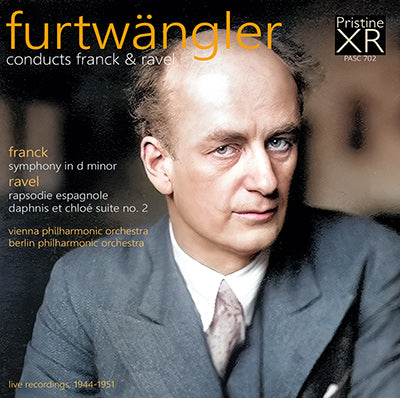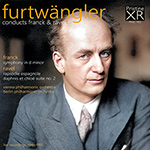
This album is included in the following sets:
This set contains the following albums:
- Producer's Note
- Full Track Listing
- Cover Art
Wilhelm Furtwängler’s association with the performance of French music isn’t one which immediately comes to mind when one thinks of the conductor. Many of his finest moments are widely considered to be when playing music from the Austro-Germanic tradition – one thinks immediately of Beethoven and Wagner, Schubert and Bruckner, Mozart and Brahms.
Yet, as John Ardoin points out in his 1994 book, The Furtwängler Record, at least one major French work seemed to bring the best out of the conductor:
“If one measures Furtwängler’s performance of the Franck Symphony by the concert version rather than by the one made in Decca’s studio (even given the inferior sound of the live recording), it is evident that he had a splendid affinity for this most German of French symphonies. The work has a good many watered-down, Tristan characteristics — its unrest and yearning, its chromaticism, its mournful English horn pipings in the second movement — and it is these upon which Furtwängler capitalizes.
The 1945 performance is luxurious, with a panoramic sense of space, a generosity of phrase, and a broad dynamic range. Nothing is hurried or pressed, and even the fortissimo accents have a soft-edged texture. The sensation of suspension felt in the opening lento is released in an exciting way in the vigorous allegro that follows, which Furtwängler prepares with an accelerando spanning a dozen bars.
The second movement is closer to andante than to Franck’s allegretto, but this might be an aural illusion. Rather than making the harp chords and strong pizzicatos overly secco, as often happens Furtwängler allows each note to vibrate the value of a full quarter note. He also pulls back a degree or two at the double bar with the introduction of the movement’s contrasting, filmy theme. The Iast movement is solidly allegro non troppo, again with the secondary idea at the first double bar taken slightly out of context.”
I’ve paired the Franck with two live recordings of music by Ravel, a composer often featured in Furtwängler’s repertoire during his lifetime, but whose lightness of touch Ardoin considers somewhat absent in the conductor’s interpretations.
Perhaps – but as always when listening to challenging source material – an opinion worth at least questioning again when a significantly improved recording is made available.
With this new Ambient Stereo XR remastering it is probably worth reassessing all of these performances, as it makes such a huge difference to the sound quality of each of these live recordings as to almost render them entirely new propositions. It seems certain that the two wartime broadcasts were recorded using early tape technology, the shortcomings of which are more audible in the Franck, where a certain amount of fluttering can occasionally be heard in the upper frequencies where the medium has deteriorated over time. I’ve done as much as I can to reduce the annoyance of this but have been unable to entirely eradicate it. Likewise there was some overload to be heard in the wartime Ravel – the Daphnis and Chloé Suite – which can only be partially tamed. That said, the Symphony, together with both Ravel works, has been utterly transformed – brought to brand new life – in these new remasters, which I’m sure will delight listeners more used to the dim and often dismal sound of the past.
Andrew Rose
FURTWÄNGLER conducts Franck and Ravel
FRANCK Symphony in D minor
1. 1st mvt. - Lento - Allegro non troppo (17:58)
2. 2nd mvt. - Allegretto (10:43)
3. 3rd mvt. - Allegro non troppo (10:30)
Vienna Philharmonic Orchestra
Recorded Grosser Saal, Musikverein, Vienna, 28-29 January 1945
RAVEL Rapsodie Espagnole
4. 1. Prélude à la nuit (4:29)
5. 2. Malagueña (2:09)
6. 3. Habanera (2:40)
7. 4. Feria (6:51)
Vienna Philharmonic Orchestra
Recorded Stuttgart-Degerloch, Waldheim, 22 October 1951
RAVEL Daphnis et Chloé Suite No. 2
8. 1. Lever de jour (5:33)
9. 2. Pantomime (6:41)
10. 3. Danse générale (4:07)
Berlin Philharmonic Orchestra
Recorded Berlin Staatsoper, 19 March 1944
conducted by Wilhelm Furtwängler
XR Remastered by Andrew Rose
Cover artwork based on a photograph of Wilhelm Furtwängler
Total duration: 71:41

